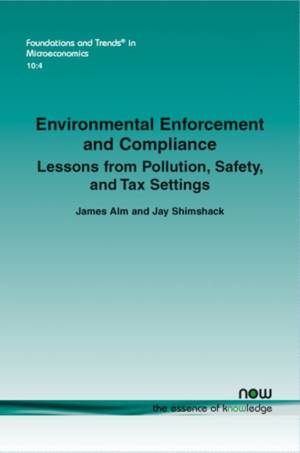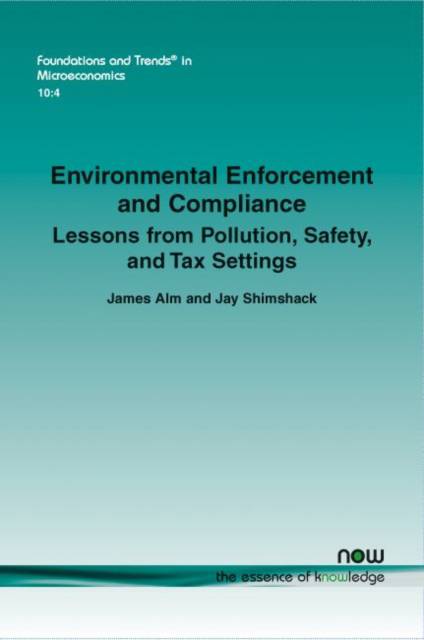
- Afhalen na 1 uur in een winkel met voorraad
- Gratis thuislevering in België vanaf € 30
- Ruim aanbod met 7 miljoen producten
- Afhalen na 1 uur in een winkel met voorraad
- Gratis thuislevering in België vanaf € 30
- Ruim aanbod met 7 miljoen producten
Zoeken
Environmental Enforcement and Compliance
Lessons from Pollution, Safety, and Tax Settings
James Alm, Jay Shimshack
€ 57,45
+ 114 punten
Omschrijving
Environmental Enforcement and Compliance: Lessons from Pollution, Safety, and Tax Settings reviews what economists do and do not know about the effectiveness and cost effectiveness of pollution monitoring and enforcement. The focus is mainly on lessons for and from the U.S. policy environment but discusses important research findings from international settings as well. The authors draw most of their insights from a subjective assessment of the existing theoretical, experimental, and empirical environmental economics literature but, where appropriate, lessons are drawn from criminal, tax compliance, and occupational health and safety settings. The criminal literature is examined because the historical law and economic foundations of the environmental enforcement literature were developed in this context. The tax context is considered because the availability of data have generated an especially rich and diverse theoretical, empirical, and experimental literature, which has also been often applied to environmental compliance. The authors draw on the health and safety literature because the Occupational Safety and Health Administration and the Environmental Protection Agency have similarly broad regulatory authority and often share institutional features. Environmental Enforcement and Compliance: Lessons from Pollution, Safety, and Tax Settings focuses is on five questions: (1) What do environmental monitoring and enforcement actions look like in the real world? (2) How do we assess environmental compliance and deterrence? (3) Do environmental monitoring and enforcement actions get results? (4) How, why, and when do inspections and sanctions achieve compliance and reduce pollution? And (5) what do the answers to the preceding questions tell us about designing and implementing more effective and more cost effective public policies for the environment? After an introduction, section 2 reviews key institutions. Section 3 discusses measuring environmental performance and compliance, paying particular attention to the perils and promise of assessing compliance in the presence of self-reported pollution. Section 4 summarizes how inspections and sanctions might influence compliance, and section 5 reviews the existing evidence on the deterrence effects of environmental monitoring and enforcement. Section 6 investigates lessons from occupational safety and tax compliance settings. Section 7 explores mechanisms and motivations for compliance, focusing on both rational-actor models and more recent socio-behavioral models. Section 8 highlights key lessons for policy, and section 9 briefly concludes with directions for future research.
Specificaties
Betrokkenen
- Auteur(s):
- Uitgeverij:
Inhoud
- Aantal bladzijden:
- 82
- Taal:
- Engels
- Reeks:
- Reeksnummer:
- nr. 43
Eigenschappen
- Productcode (EAN):
- 9781601988904
- Verschijningsdatum:
- 18/12/2014
- Uitvoering:
- Paperback
- Formaat:
- Trade paperback (VS)
- Afmetingen:
- 156 mm x 234 mm
- Gewicht:
- 127 g

Alleen bij Standaard Boekhandel
+ 114 punten op je klantenkaart van Standaard Boekhandel
Beoordelingen
We publiceren alleen reviews die voldoen aan de voorwaarden voor reviews. Bekijk onze voorwaarden voor reviews.











